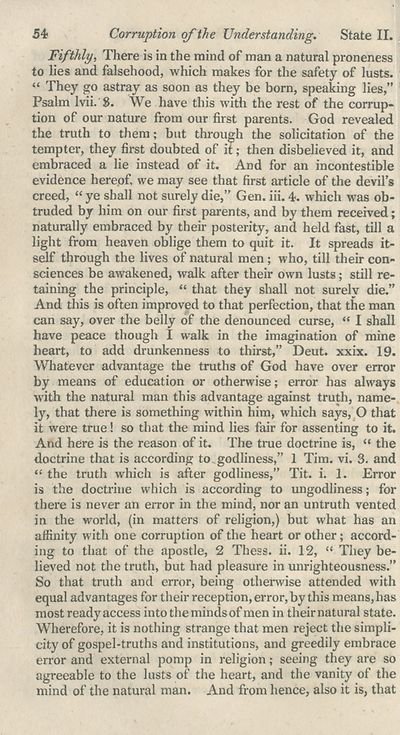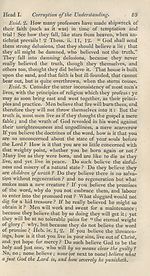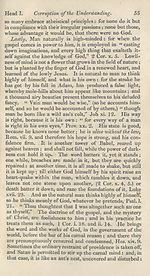Download files
Complete book:
Individual page:
Thumbnail gallery: Grid view | List view

54 Corruption of the Understanding. State II.
Fifthly, There is in the mind of man a natural proneness
to lies and falsehood, which makes for the safety of lusts.
“ They go astray as soon as they be born, speaking lies,”
Psalm Ivii. 8. We have this with the rest of the corrup¬
tion of our nature from our first parents. God revealed
the truth to them; but through the solicitation of the
tempter, they first doubted of it; then disbelieved it, and
embraced a lie instead of it. And for an incontestible
evidence hereof, we may see that first article of the devil’s
creed, “ ye shall not surely die,” Gen. iii. 4. which was ob¬
truded by him on our first parents, and by them received;
naturally embraced by their posterity, and held fast, till a
light from heaven oblige them to quit it. It spreads it-
sdf through the lives of natural men; who, till their con¬
sciences be awakened, walk after their own lusts; still re¬
taining the principle, “ that they shall not surely die.”
And this is often improved to that perfection, that the man
can say, over the belly of the denounced curse, “ I shall
have peace though I walk in the imagination of mine
heart, to add drunkenness to thirst,” Dent. xxix. 19.
Whatever advantage the truths of God have over error
by means of education or otherwise; error has always
with the natural man this advantage against truth, name¬
ly, that there is something within him, which says, O that
it were true! so that the mind lies fair for assenting to it.
And here is the reason of it. The true doctrine is, “ the
doctrine that is according to. godliness,” 1 Tim. vi. 3. and
“ the truth which is after godliness,” Tit. i. 1. Error
is the doctrine which is according to ungodliness; for
there is never an error in the mind, nor an untruth vented
in the world, (in matters of religion,) but what has an
affinity with one corruption of the heart or other; accord¬
ing to that of the apostle, 2 Thess. ii. 12, “ They be¬
lieved not the truth, but had pleasure in unrighteousness.”
So that truth and error, being otherwise attended with
equal advantages for their reception, error, by this means, has
most ready access into the minds of men in their natural state.
Wherefore, it is nothing strange that men reject the simpli¬
city of gospel-truths and institutions, and greedily embrace
error and external pomp in religion; seeing they are so
agreeable to the lusts of the heart, and the vanity of the
mind of the natural man. And from hence, also it is, that
Fifthly, There is in the mind of man a natural proneness
to lies and falsehood, which makes for the safety of lusts.
“ They go astray as soon as they be born, speaking lies,”
Psalm Ivii. 8. We have this with the rest of the corrup¬
tion of our nature from our first parents. God revealed
the truth to them; but through the solicitation of the
tempter, they first doubted of it; then disbelieved it, and
embraced a lie instead of it. And for an incontestible
evidence hereof, we may see that first article of the devil’s
creed, “ ye shall not surely die,” Gen. iii. 4. which was ob¬
truded by him on our first parents, and by them received;
naturally embraced by their posterity, and held fast, till a
light from heaven oblige them to quit it. It spreads it-
sdf through the lives of natural men; who, till their con¬
sciences be awakened, walk after their own lusts; still re¬
taining the principle, “ that they shall not surely die.”
And this is often improved to that perfection, that the man
can say, over the belly of the denounced curse, “ I shall
have peace though I walk in the imagination of mine
heart, to add drunkenness to thirst,” Dent. xxix. 19.
Whatever advantage the truths of God have over error
by means of education or otherwise; error has always
with the natural man this advantage against truth, name¬
ly, that there is something within him, which says, O that
it were true! so that the mind lies fair for assenting to it.
And here is the reason of it. The true doctrine is, “ the
doctrine that is according to. godliness,” 1 Tim. vi. 3. and
“ the truth which is after godliness,” Tit. i. 1. Error
is the doctrine which is according to ungodliness; for
there is never an error in the mind, nor an untruth vented
in the world, (in matters of religion,) but what has an
affinity with one corruption of the heart or other; accord¬
ing to that of the apostle, 2 Thess. ii. 12, “ They be¬
lieved not the truth, but had pleasure in unrighteousness.”
So that truth and error, being otherwise attended with
equal advantages for their reception, error, by this means, has
most ready access into the minds of men in their natural state.
Wherefore, it is nothing strange that men reject the simpli¬
city of gospel-truths and institutions, and greedily embrace
error and external pomp in religion; seeing they are so
agreeable to the lusts of the heart, and the vanity of the
mind of the natural man. And from hence, also it is, that
Set display mode to:
![]() Universal Viewer |
Universal Viewer | ![]() Mirador |
Large image | Transcription
Mirador |
Large image | Transcription
| Antiquarian books of Scotland > Religion & morality > Human nature in its fourfold state > (72) |
|---|
| Permanent URL | https://digital.nls.uk/118584560 |
|---|
| Description | Thousands of printed books from the Antiquarian Books of Scotland collection which dates from 1641 to the 1980s. The collection consists of 14,800 books which were published in Scotland or have a Scottish connection, e.g. through the author, printer or owner. Subjects covered include sport, education, diseases, adventure, occupations, Jacobites, politics and religion. Among the 29 languages represented are English, Gaelic, Italian, French, Russian and Swedish. |
|---|

